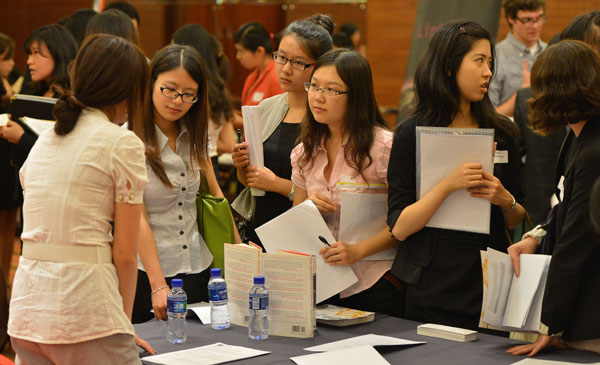First-tier cities like Beijing, Guangzhou and Shanghai are becoming more popular among university graduates, according to a recent employment survey.
 |
|
University graduates and other job seekers attend a job fair in Beijing on Sept 3. PROVIDED TO CHINA DAILY |
The survey, conducted by ChinaHR.com, a human resources service provider, polled about 32,000 university graduates nationwide. It showed 63 percent of respondents hope to stay in first-tier cities for at least one year after graduation this year. In 2011, the figure was 38 percent.
Liu Xingyang, a senior consultant at the agency, said graduates now feel this way mainly because of the increasing return of people to big cities after hoping to settle in lower-cost small cities.
In the past two years, some people left first-tier cities where they worked and went back to their hometowns or sought jobs in second-tier cities or even small places because in first-tier cities, housing prices have become too high, he said.
But many people could not get used to smaller cities because in such places, social connections, rather than abilities, usually determine one's promotions or social status. Some graduates even found they could not easily communicate with people from the area because of "cultural differences", so many started to return to big cities, Liu said.
"Such phenomena have been largely reported by the media, sparking many university graduates' desire to work in first-tier cities," he said.
Liu said first-tier cities are attractive to university graduates because they have more opportunities, greater development platforms, a fairer competitive environment, and a more diversified cultural environment.
In fact, except for housing, the living costs in first-tier cities are not much higher than second- or third-tier cities, he added.
Tang Yuan, 23, who was an English major of a university in Sichuan province and who graduated in June, is seeking a job in Beijing.
"I want to try to see if I am competitive enough to work in Beijing," she said. "At least I can get work experience here, which would help my future work in other places."
The survey found that among first-tier cities, Beijing was the most attractive to both nationwide and local university graduates.
About 26 percent of graduates nationwide hope to seek a job in the capital city, and 72 percent of graduates who studied in the city hope to stay there after graduation, according to the survey.
Guangzhou attracts half the local graduates, the same as last year, and it attracts 3.8 percent of nationwide graduates.
The idea of returning to his hometown of Yichun, a small city in Jiangxi province, to work never occurred to Tang Jinfeng when he graduated from Jinan University in Guangzhou in July with a master's degree in journalism.
"It's difficult to find a job in a small city that can give a full play to the knowledge and skills I have learned at college in the past seven years. There are more and better job opportunities in first-tier cities such as Guangzhou," said the 26-year-old, who works for a newspaper in Guangzhou.
He added he found big cities more appealing also because the employment and promotion processes in their enterprises are more transparent than they are in small cities.
He said that at least 60 percent of his college classmates have stayed in the city after graduation.
Shanghai attracts 8.5 percent of nationwide university graduates but it attracts only 38 percent of local university graduates, much lower than last year's 72 percent, said the survey.
Explaining Shanghai's decline in attracting local graduates, Liu said Shanghai's neighboring cities in Zhejiang and Jiangsu provinces, such as Hangzhou, Suzhou, Nanjing, Wuxi and Ningbo, are becoming more attractive to graduates because those cities have lower living costs and provide more job opportunities as their economic development environment matures.
An example Liu cites is Suzhou, which has a big demand for skilled technicians because of its rapid industry upgrades, and the city offers very favorable wage packages to lure talent.
Lu Shiwei found a public-service job in Henan province after graduation from a university in Shanghai.
"My parents wanted me to take a public-service job, and Henan is not far from my hometown, Hebei," said Lu.
But some local graduates still make Shanghai their first choice when deciding where to settle down.
One such graduate is Zhang Shanshan, who just finished her internship as a sales staff member at a foreign-funded corporation in Shanghai.
"I hope I can find a job at a foreign-invested company by the end of the year in Shanghai because I like this place and I could not find a proper job if I went back home to Jilin," said the 22-year-old.
Chen Yu, director of the China Institute for Occupation Research at Peking University, believes university students' decision of where to work is spontaneous.
"Almost all people want to go to places where industries are concentrated, jobs are easy to find and the living environment is good," he said, "But it's not appropriate for everyone to work in first-tier cities."
Chen suggests university graduates choose their workplace according to their majors and abilities, rather than merely following the choices of others.
Contact the writers at chenxin1@chinadaily.com.cn and xujingxi@chinadaily.com.cn
Ma Yiyun in Shanghai contributed to this story.
